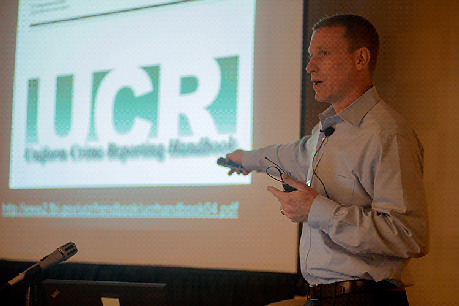By Zachary Matson and Meredith Turk

Steve Thompson, from The Dallas Morning News, speaks during the panel "Juking the stats? Delve into your police department's FBI crime data to find flaws" on Thursday. Photo: Travis Hartman.
When it comes to FBI crime statistics, "I can't think of a number that means more to a community and is less scrutinized," said Ben Poston of the Los Angeles Times. Each city and state might have different ways to track crime, and digging deeper into how they do it and the results they tout can be ripe for investigative stories.
While the FBI’s crime reporting is not a required program, many people rely on these stats to track crime in their community, and police rely on them to identify better policing practices. Since it is not a required system, states and localities will interpret reporting requirements differently and often pushed the bounds of what is seemly.
“It’s a voluntary system, and they can openly flaunt it," Poston said.
While reporting for the Dallas Morning News, Steve Thompson examined claims by the police department and city officials that crime was declining, but discovered that crimes were actually being misreported. Aggravated assaults were being recoded simple assaults even though incident narratives plainly stated that weapons were involved. When crimes are misclassified, it can create an illusion of reduced crime.
It's next to impossible to accurately compare crime statistics between cities and states. Poston recommends never doing this. Crime numbers, reported by the FBI, which is dictated by the Uniform Crime Reporting Handbook (UCR), is filled with incomparable data.
Ben Poston of the LA Times and Steve Thompson of the Dallas Morning News shared specific examples of when they used their own crime analysis to expose misclassification of crime data.
When crimes are misclassified, it can create an illusion of reduced crime.
A few key points about misclassification:
- Robbery, burglary, aggravated assault are ripe for misclassification
- Aggravated assaults make up the biggest area of crime in cities, so this is an important part to analyze.
What documents you should have:
- UCR handbook
- Quarterly crime data from police station
- A copy of DA's Case Management Database
- Incident reports with narratives
Tips to begin investigating crime :
- To start take a week sample of assault- simple and aggravated.
- Update your data every quarter and you can create your own data and see trends that may be missed.
- Send your data to the state or federal UCR program and they gave comments about whether it was mislabeled.
- Connect with your UCR state representative. Other state's representatives might be helpful, too.
- There is often a front end report (hard copy police report, database file of the report) and a back end report(frozen report sent to the FBI), and you can check for reclassification, which could change the numbers.
- FBI audits are very minimal, and often not comprehensive. State's rarely audit. Departments rarely do as well.
In Poston's recommendation, what to do better next time:
- Go straight to the source
- Request a copy of your police dept's automated reporting
- You should be able to ask for the fields on the face sheet of the report
- Your key fields are the police incident report number, suspect/victim, FBI crome code, weapon codes, time/date/placem and a short narrative that describes the elements of the offense.
- When you just request the face sheet, they don't need to redact as much. Just exclude victim name.
- Can you search databases for text filters: "entry", "force", "blunt" to help find crimes
- The narrative might have some interesting insight into how the crime is coded. A cop calls the supervisor and might be called to change the coding.
Check out Poston's story about Milwaukee:
Check out Thompson's story about Dallas:
Zachary Matson and Meredith Turk are journalism students at the University of Missouri

